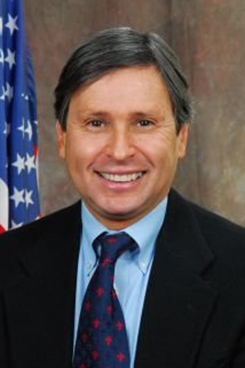Long Island Judge Recommended for Removal From Office After Emailing Slurs, Vulgar Language to Clients
Senzer sent his clients several emails, in which he used slurs and derogatory language to describe their daughter, her attorney, a judge and school teachers.
October 17, 2019 at 02:09 PM
6 minute read
 Northport Village Court at 224 Main Street in Northport, N.Y. Photo: Office of Court Administration
Northport Village Court at 224 Main Street in Northport, N.Y. Photo: Office of Court Administration
A village justice in Suffolk County was recommended to be removed from the bench Thursday after, according to a state Commission on Judicial Conduct decision, he was found to have used several derogatory terms, including "bitch" and "c**t on wheels" to refer to individuals in a visitation matter that he was involved in as an attorney in Family Court.
 Justice Paul Senzer
Justice Paul SenzerJustice Paul Senzer, an attorney and jurist of the Northport Village Court, was recommended for removal from office by the commission after more than two decades on the bench.
Robert Tembeckjian, administrator of the commission, called Senzer's behavior "vile" and said his conduct merited removal from judicial office.
"It is simply unacceptable for a judge to demean women with vile and otherwise abhorrent language," Tembeckjian said. "Doing so reveals prejudice and undermines public confidence in the administration of justice."
"It should be clear that a person who cavalierly uses gender-biased slurs does not belong on the bench," Tembeckjian continued.
Senzer was represented before the commission by David Besso and Michelle Aulivola from Long Tuminello in Suffolk County. Besso said Senzer plans to appeal the decision to the Court of Appeals, the state's highest court, which has the power to reverse, modify, or affirm it.
"We were surprised by the decision. I think it was one of the greatest miscarriages of justice regarding the judiciary I've ever seen," Besso said. "The judge has an unblemished record on the bench. The allegations made against him had nothing to do with his judicial duties."
Besso said that, because Senzer used the vulgar language in his work as a private attorney, he should be held to a different standard than if he acted that way on the bench. He argued that the Court of Appeals has never removed a judge for private conversations made with clients.
Senzer's behavior would have gone unnoticed if not for one of his clients, who sent emails containing the vulgar language to another attorney, who then reported it the Commission on Judicial Conduct.
That client, Jennifer Coleman, retained Senzer about five years ago to represent her and her husband in a visitation case against their daughter. Coleman, who's known Senzer for three decades, was seeking visitation rights to see their grandchild.
Coleman had worked for Senzer as his house cleaner for several years and occasionally agreed to watch his cat. She and her husband sought Senzer's help because their relationship with their daughter was strained, according to the commission.
Over about five months while Coleman and her husband were trying to navigate the visitation case, Senzer sent them several emails, in which he used slurs and derogatory language to describe their daughter, her attorney, a judge and school teachers.
According to those emails, he called their daughter a "bitch" and a "scumbag," among other terms.
"We will appear entirely calm and reasonable … let your daughter act like the asshole she is," Senzer wrote to the Colemans in an email before a court appearance.
Senzer used a pair of sexist terms to describe the attorney representing Coleman's daughter. In one email, he called her a "c**t on wheels," without censoring the term, and also referred to her as "eyelashes."
He also used vulgar language to describe the referee in Family Court overseeing the case between the Colemans and their daughter. Senzer was advising the Colemans, at the time, to drop their case.
"[Y]ou may have noticed that the 'judge' is an asshole," Senzer wrote. "An 'asshole' can issue a warrant for your arrest."
He also, at one point, advised the Colemans not to contact the school that their daughter's child attended, saying that "people who work in schools are assholes."
Those emails may have gone overlooked if Coleman hadn't sent them to another attorney months after she decided to drop their case in 2015.
Coleman had contacted Senzer because she said he owed her a refund from what she paid him to represent her. She never heard back from Senzer about the refund, according to the commission.
She then read a news article about a lawsuit filed against Senzer. Coleman decided to contact the attorney in the lawsuit against Senzer and forwarded him the emails he'd sent her and her husband during their visitation case.
That attorney, Christopher Cassar, sent those emails to the state Commission on Judicial Conduct, which launched an investigation into the matter.
Aside from the language used in the emails sent to Cassar from Coleman, Senzer was also accused of using a racial slur to refer to an administrative law judge while speaking with the Colemans. Two witnesses testified before the commission that Senzer used the slur.
But the majority of the commission agreed in its decision that there wasn't enough evidence to prove Senzer had used the racial epithet.
Joseph Belluck, who chairs the Commission on Judicial Conduct, wrote a dissent against the majority, in which he said that Senzer's willingness to use the other derogatory remarks showed he was willing to use other offensive terms as well.
"Respondent's liberal use of such profoundly crude and blatantly sexist language to describe his clients' daughter and her female lawyer makes utterly credible the allegation that he used racist language of a similarly extreme nature in reference to the administrative law judge," Belluck wrote.
Senzer did not immediately return a call for comment on the emails and the commission's decision to remove him from the bench Thursday. His attorneys also did not immediately return a call for comment.
During a hearing on the allegations of misconduct, Senzer apologized and conceded to a referee that the language he used in the emails was "atrocious" and "reflect[ s] very poorly on me as an attorney and obviously, as a judge."
READ MORE:
North Country Town Court Justice Resigns in Wake of Posting Photo of Noose on Facebook
Upstate Town Justice Retires After Signing Arrest Warrant for Client's Husband
Western NY Town Justice Resigns After Publicly Criticizing Attorneys, Criminal Justice Laws
Robert Tembeckjian Decries 'Dark and Pessimistic State of Affairs'
This content has been archived. It is available through our partners, LexisNexis® and Bloomberg Law.
To view this content, please continue to their sites.
Not a Lexis Subscriber?
Subscribe Now
Not a Bloomberg Law Subscriber?
Subscribe Now
NOT FOR REPRINT
© 2025 ALM Global, LLC, All Rights Reserved. Request academic re-use from www.copyright.com. All other uses, submit a request to [email protected]. For more information visit Asset & Logo Licensing.
You Might Like
View All
Why Wait? Arbitrate! The Value of Consenting to Arbitrate Your SUM Cases at NAM
5 minute read
Bipartisan Lawmakers to Hochul Urge Greater Student Loan Forgiveness for Public-Interest Lawyers

Testing The Limits of “I Agree”: Court of Appeals Examines Clickwrap Arbitration Agreements
13 minute read
Antitrust Yearly Recap: Aggressive Changes By The Biden Administration Precede President Trump’s Return
14 minute readTrending Stories
- 1'A Death Sentence for TikTok'?: Litigators and Experts Weigh Impact of Potential Ban on Creators and Data Privacy
- 2Bribery Case Against Former Lt. Gov. Brian Benjamin Is Dropped
- 3‘Extremely Disturbing’: AI Firms Face Class Action by ‘Taskers’ Exposed to Traumatic Content
- 4State Appeals Court Revives BraunHagey Lawsuit Alleging $4.2M Unlawful Wire to China
- 5Invoking Trump, AG Bonta Reminds Lawyers of Duties to Noncitizens in Plea Dealing
Who Got The Work
J. Brugh Lower of Gibbons has entered an appearance for industrial equipment supplier Devco Corporation in a pending trademark infringement lawsuit. The suit, accusing the defendant of selling knock-off Graco products, was filed Dec. 18 in New Jersey District Court by Rivkin Radler on behalf of Graco Inc. and Graco Minnesota. The case, assigned to U.S. District Judge Zahid N. Quraishi, is 3:24-cv-11294, Graco Inc. et al v. Devco Corporation.
Who Got The Work
Rebecca Maller-Stein and Kent A. Yalowitz of Arnold & Porter Kaye Scholer have entered their appearances for Hanaco Venture Capital and its executives, Lior Prosor and David Frankel, in a pending securities lawsuit. The action, filed on Dec. 24 in New York Southern District Court by Zell, Aron & Co. on behalf of Goldeneye Advisors, accuses the defendants of negligently and fraudulently managing the plaintiff's $1 million investment. The case, assigned to U.S. District Judge Vernon S. Broderick, is 1:24-cv-09918, Goldeneye Advisors, LLC v. Hanaco Venture Capital, Ltd. et al.
Who Got The Work
Attorneys from A&O Shearman has stepped in as defense counsel for Toronto-Dominion Bank and other defendants in a pending securities class action. The suit, filed Dec. 11 in New York Southern District Court by Bleichmar Fonti & Auld, accuses the defendants of concealing the bank's 'pervasive' deficiencies in regards to its compliance with the Bank Secrecy Act and the quality of its anti-money laundering controls. The case, assigned to U.S. District Judge Arun Subramanian, is 1:24-cv-09445, Gonzalez v. The Toronto-Dominion Bank et al.
Who Got The Work
Crown Castle International, a Pennsylvania company providing shared communications infrastructure, has turned to Luke D. Wolf of Gordon Rees Scully Mansukhani to fend off a pending breach-of-contract lawsuit. The court action, filed Nov. 25 in Michigan Eastern District Court by Hooper Hathaway PC on behalf of The Town Residences LLC, accuses Crown Castle of failing to transfer approximately $30,000 in utility payments from T-Mobile in breach of a roof-top lease and assignment agreement. The case, assigned to U.S. District Judge Susan K. Declercq, is 2:24-cv-13131, The Town Residences LLC v. T-Mobile US, Inc. et al.
Who Got The Work
Wilfred P. Coronato and Daniel M. Schwartz of McCarter & English have stepped in as defense counsel to Electrolux Home Products Inc. in a pending product liability lawsuit. The court action, filed Nov. 26 in New York Eastern District Court by Poulos Lopiccolo PC and Nagel Rice LLP on behalf of David Stern, alleges that the defendant's refrigerators’ drawers and shelving repeatedly break and fall apart within months after purchase. The case, assigned to U.S. District Judge Joan M. Azrack, is 2:24-cv-08204, Stern v. Electrolux Home Products, Inc.
Featured Firms
Law Offices of Gary Martin Hays & Associates, P.C.
(470) 294-1674
Law Offices of Mark E. Salomone
(857) 444-6468
Smith & Hassler
(713) 739-1250






